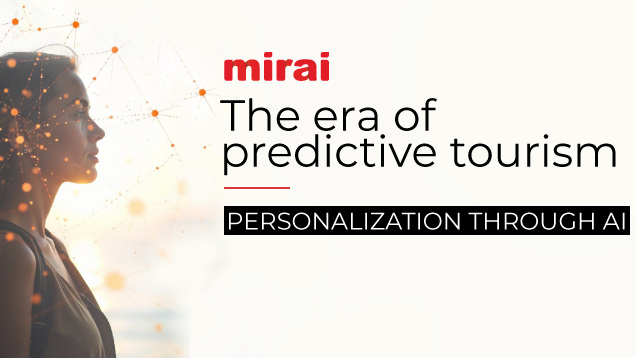As a hotelier, but also as a traveler: forget the days of generic recommendations. AI is the Travel industry’s crystal ball, predicting what you desire with astonishing accuracy.
NB: This is an article from mirai, one of our Expert Partners
Subscribe to our weekly newsletter and stay up to date
This isn’t your grandpa’s travel agent; AI knows you better than you know yourself, crafting bespoke travel experiences you never knew you needed.
Say goodbye to endless scrolling and hello to your AI travel companion. It’s like having a personal assistant who anticipates your every whim, curating dream vacations that perfectly match your unique tastes. What once seemed like futuristic fantasy is now your reality!
As a company in the travel sector: AI revolution isn’t just about offering personalized travel experiences. With AI, digital marketing is about to level up and completely transform the game.
What is predictive tourism?
Predictive tourism is the art and science of using AI combined with in-depth data analysis to foresee the needs of travelers and deliver highly personalized experiences. During the planning and booking stages, AI is hard at work, learning about your tastes and preferences, predicting what you’ll need, offering tailored recommendations and personalizing your journey in real-time.
But the magic doesn’t stop there. During the stay, AI continues to enhance your experience:
- Smart Hotels, with rooms that already auto adjust temperature & lighting, have virtual concierges…
- Smart Destinations, with optimized routes & activities based on your real-time location and interests.
- Personalized Experiences: envision tailored guided tours, activities adapted to your fitness level and recommendations for cultural events that you will absolutely love.
Ultimately, predictive tourism aims to make travel more satisfying, efficient and memorable for both travelers and the businesses that serve them.
Key technologies powering predictive tourism
Three technologies are at the forefront of this transformation:
- Machine Learning (ML): this allows machines to learn from massive datasets including travel history, searches and reviews. By identifying patterns within this data, ML algorithms can then predict preferences and provide personalized recommendations.
- Deep Learning (DL): this advanced form of ML uses neural networks to analyze unstructured data such as images, text and voice much like the human brain does. DL can be used, for example, to identify tourist spots in photos.
- Natural Language Processing (NLP): this enables machines to understand, interpret and generate human language in any language. In tourism, NLP powers chatbots, analyzes customer reviews and can translate languages.
Benefits for Travelers and Businesses
The benefits of predictive tourism are significant:
For Travelers
- Personalized experiences with tailored recommendations that match individual tastes and budgets.
- Time and effort savings as AI handles the often-tedious aspects of planning.
- Discovery of new options that push travelers outside of their usual comfort zones.





